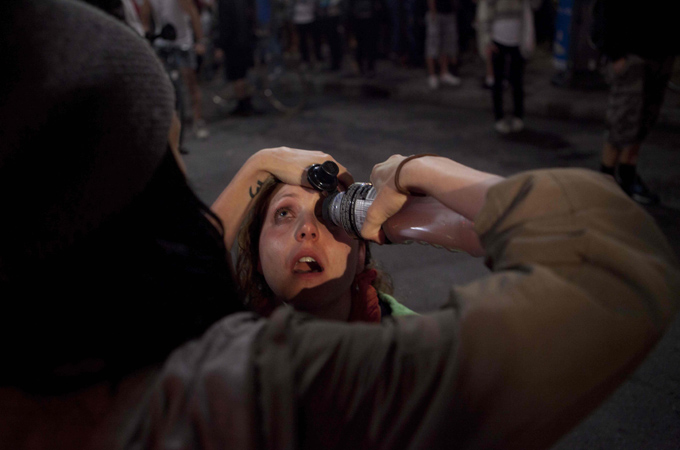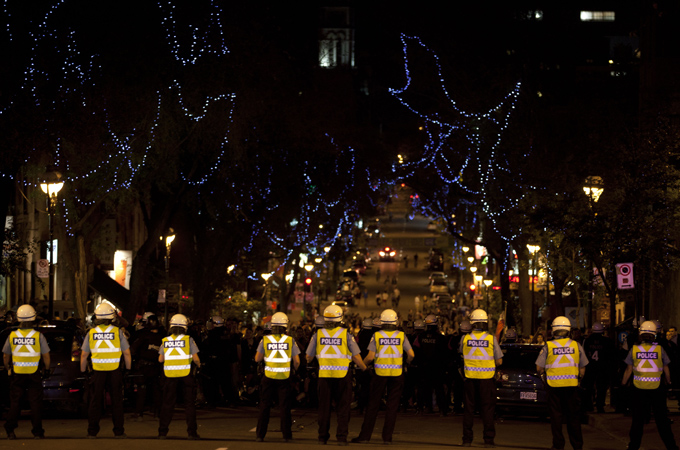Protests cast shadow over Canada Grand Prix
Spectre of violence looms as Montreal readies to host Formula 1 amid continuing student protests over tuition fee hike.

Montreal, Quebec – A meagre group of demonstrators jeered at a column of police cars as they prepared to march through the soggy city streets, on the 114th day of student strikes here.
“I don’t know why we are so few,” said Amelie Barsalou, 20, as she drummed a wooden spoon against a frying pan in unison with some fifty people. “I think that people are getting bored, or maybe it’s the rain,” she said.
But like the unseasonable weather of late, the unresolved student crisis has left an atmosphere of uncertainty hanging over the city as it gears up to launch the summer festival season with its biggest money-maker, the Canadian Grand Prix.
For business owners and tourism officials, the last two weeks of relatively small, peaceful demonstrations are a welcome change from months of strikes that have roiled the city – resulting in nearly 1,600 arrests, and over $7m Canadian dollars (US $6.81m) in police overtime.
 |
| Police have often used tear gas against the young protesters [Mimi Wells] |
Tensions surrounding the Grand Prix hit a fevered pitch on Sunday, when the event organisers made a last-minute announcement cancelling a racetrack open-house for the public scheduled for Thursday, citing fears that demonstrators would use it as an opportunity to sabotage the Formula 1 weekend.
“Cancelling the open house day was the only action we could take,” said Canadian Grand Prix president Francois Dumontier. A review of event security “revealed some risks we could not neglect”, he said.
But student leaders said that their fears were overblown.
“We have repeated 100 times in the media that we are not planning to block the event from happening,” said student leader Gabriel Nadeau-Dubois.
The head of the largest student association in Montreal, Martine Desjardins, said that her group would send just 20 members to the weekend Grand Prix events, to hand out literature and small squares of red cloth – the symbol of the student movement.
“We have spent the last few days cutting a lot of red material, maybe 100 metres, and we are ready to put them on people who want them,” she said. “But we always respect the rules. If people want us to quit the place, we will do so.”
Uncertainty over Formula 1
But the movement has grown since the strike first broke out in February, after the government introduced a plan to hike university tuition by 82 per cent over seven years. Since then, it has ballooned into a larger social movement of anti-capitalists, labour unions, and anarchists, and their plans for the Formula 1 weekend remain unclear.
With 310 million people worldwide expected to tune in to television coverage of the weekend, Montreal student associations say they will take advantage of the exposure to tell their side of the story to a wide audience.
|
“For several weeks, ticket sales have been very low. Nothing like what we normally see.”“ – Francois Dumontier |
“We think people will want to talk with us. They want more information,” said Desjardins.
Others have pledged to interrupt the event outright – and this is not the first time that the race has come under fire from activists angered by the display of wealth and opulence, especially in countries with social unrest.
When the Grand Prix arrived in Bahrain in April, the hacker group Anonymous jammed the race website with a message calling King Hamad bin al-Khalifa a “murderer” for his lethal crackdown on anti-government protesters.
In Montreal, demonstrators have sometimes clashed violently with police, but many say that the biggest risk is not the threat of violence, but a restriction of civil rights – in the form of a controversial emergency law passed through the Quebec General Assembly less than a month ago – known here as Bill 78.
The legislation prohibits wearing masks during demonstrations and requires marchers to submit an itinerary to city police eight hours in advance. In theory, violators can be fined between CAD $1,000-$5,000 (US $973 to $4,867) – but so far Bill 78 has not been enforced, and its only real impact has been to further unify disparate protest groups in their animosity towards Premier Jean Charest and the ruling Liberal Party.
Fears that a botched Formula 1 weekend could lead to a disastrous summer festival season, which provides vital income for the Montreal economy, have spread to the mayor’s office.
Low ticket sales
Last week, Montreal Mayor Gerald Tremblay told journalists that he was making an appeal to the “maturity and responsibility” of protesters, with the hope that they would conduct their demonstrations without “causing harm to merchants, hotels and restaurateurs”.
In past years some 300,000 visitors have flooded the streets of Montreal to celebrate the race weekend, and this year the city is expecting to rake in CAD $90m (US $87.6m) from the event.
 |
| Montreal authorities hope protesters will not interfere with the Canadian Grand Prix [Mimi Wells] |
But hotel bookings here were down almost 11 per cent last month from the same time last year – numbers for June have not yet been released – and last week, Dumontier told the French-language press that ticket sales for the Grand Prix are also down.
“For several weeks, ticket sales have been very low,” he said. “Nothing like what we normally see.”
Whether worldwide economic woes could be affecting ticket sales remains unclear, but graphic images of protesters and police clashing in the Canadian and international press could be deterring potential visitors.
Student leaders point out that some of the biggest demonstrations have been carried out without incident, like the afternoon of May 22, when about 200,000 people marched peacefully to mark the 100th day of the movement.
But the violence has been difficult to predict. Two days later marchers clashed with police, and more than 500 people were arrested.
This unpredictability has many demonstrators and their supporters saying that they will stay away from the Grand Prix.
“They’ve started chanting ‘Charest! You’re laughing now but wait and see what happens to your Grand Prix,’ said Amelie Barsalou, 20. “I’m a little bit scared.”
The Montreal police are expected to have a heavy presence at all race events this weekend, though a spokesperson refused to release precise numbers to the press.
“We don’t know how its going to turn out,” said a young protester who wore a mask and gave his name only as Anonymous. “It depends on how the demonstrators will act. If they really want to get nasty with the police, it could end up in a riot.”